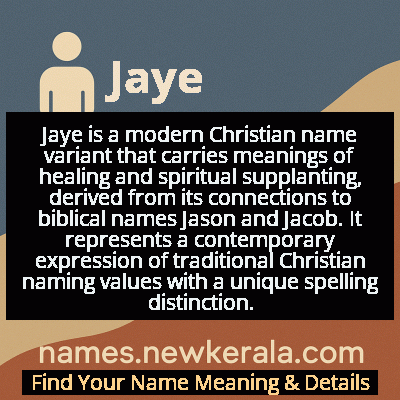Jaye Name Meaning & Details
Origin, Popularity, Numerology Analysis & Name Meaning of Jaye
Discover the origin, meaning, and cultural significance of the name JAYE. Delve into its historical roots and explore the lasting impact it has had on communities and traditions.
Name
Jaye
Gender
Male
Origin
Christian
Lucky Number
5
Meaning of the Name - Jaye
Jaye is a modern Christian name variant that carries meanings of healing and spiritual supplanting, derived from its connections to biblical names Jason and Jacob. It represents a contemporary expression of traditional Christian naming values with a unique spelling distinction.
Jaye - Complete Numerology Analysis
Your Numerology Number
Based on Pythagorean Numerology System
Ruling Planet
Mercury
Positive Nature
Adventurous, dynamic, curious, and social.
Negative Traits
Restless, impatient, inconsistent, prone to indulgence.
Lucky Colours
Green, white.
Lucky Days
Wednesday.
Lucky Stones
Emerald.
Harmony Numbers
1, 3, 9.
Best Suited Professions
Sales, marketing, travel, entertainment.
What People Like About You
Versatility, charisma, adventurous spirit.
Famous People Named Jaye
Jaye Davidson
Actor
Academy Award nomination for Best Supporting Actor in 'The Crying Game'
Jaye P. Morgan
Singer and Actress
Successful recording artist and regular panelist on 'The Gong Show'
Jaye Radisich
Politician
Youngest woman ever elected to Western Australian Parliament
Name Variations & International Equivalents
Click on blue names to explore their detailed meanings. Gray names with will be available soon.
Cultural & Historical Significance
In contemporary Christian culture, Jaye represents a bridge between traditional biblical naming conventions and modern individuality. The name's simplicity and phonetic clarity make it accessible across various Christian denominations, while the distinctive spelling allows for personal expression within the faith tradition. It has been particularly popular in Protestant communities in the United States and United Kingdom, where creative spelling variations of classic names became fashionable from the 1970s onward.
Extended Personality Analysis
Individuals named Jaye are often perceived as creative, independent thinkers who value their uniqueness while maintaining strong traditional values. They typically exhibit a blend of modern innovation and respect for heritage, making them adaptable in various social situations. Jayes are frequently described as confident yet approachable, with a natural ability to connect with people from diverse backgrounds while staying true to their personal convictions.
Common personality traits associated with Jaye include strong communication skills, emotional intelligence, and a balanced perspective that allows them to see multiple sides of situations. They often demonstrate leadership qualities tempered with humility, and their creative problem-solving abilities make them valuable in team environments. The distinctive spelling of their name often correlates with a desire to stand out while remaining grounded, resulting in individuals who are both memorable and reliable in personal and professional relationships.
Modern Usage & Popularity
Jaye remains a moderately popular name choice in English-speaking countries, particularly in the United States, United Kingdom, and Australia. While it has never reached the top 100 names in most countries, it maintains consistent usage as parents seek distinctive yet familiar names for their children. The name saw peak popularity in the 1980s and 1990s but continues to be chosen by parents who appreciate its modern feel with traditional roots. Recent trends show it being used for both genders, though it remains more common for males in Christian communities.
Symbolic & Spiritual Meanings
Symbolically, Jaye represents the concept of individuality within tradition – the idea of maintaining core values while expressing personal uniqueness. The name carries connotations of bridge-building, connecting classic heritage with contemporary expression. In Christian symbolism, it evokes the idea of being 'in the world but not of the world,' balancing faith with modern identity. The distinctive spelling adds a layer of symbolism about the importance of personal mark-making while honoring one's roots and spiritual inheritance.

